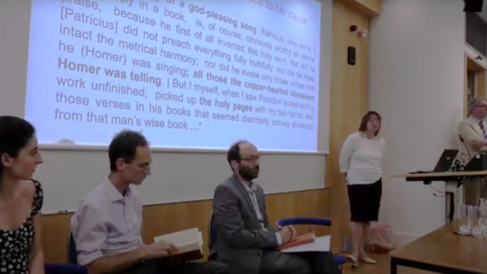
On 19th June 2024, the Cambridge Interfaith Programme and the Faculty of Divinity hosted a book launch for Dr Anna Lefteratou’s recent monograph The Homeric Centos: Homer and Bible interwoven (Oxford University Press, 2023).
The event attracted a sizeable audience on site in Cambridge and was also livestreamed via Zoom. A recording is available to watch again on the Faculty of Divinity YouTube channel (see below).
The Homeric centos is a biblical poem attributed to the Empress Eudocia (d. 460), crafted with lines taken verbatim from Homer and narrating Jesus’ incarnation, ministry, passion and ascension in a Homeric style. This re-writing of the Bible in Homeric meter takes into consideration both specific Gospel passages and contemporary exegesis, providing a unique balance between Classicism and Christianity.
A discussion with presentations
The event included a short presentation of the book by three readers, Dr Daniel Weiss (Divinity, Cambridge), Dr Aaron Pelttari (Classics, Edinburgh), and Dr Emma Greensmith (Classics, Oxford) who took turns to discuss its main points in dialogue with the author, Dr Anna Lefteratou (Divinity, Cambridge).
The discussion touched upon a variety of important topics with respect to the intercultural and interfaith dialogue in the ancient world: the importance of pagan classical education, Homer in particular, for a variety of ancient audiences, pagan, Jewish, and Christian; the impact of Christianity in refashioning and appropriating literary canons and genres that belonged to the pagan educational and cultural curriculum; and the use of authoritative theological texts as exegetical tools by pagans and Christians in the period called Late Antiquity (3rd-7th c. CE).
Excerpting and re-arranging
The event was opened by Prof George van Kooten, Lady Margaret's Professor of Divinity (Cambridge). The first speaker, Dr Weiss, highlighted how excerpting and re-arranging a sacred text for exegetical purposes is not a unique practice to the Homeric Centos but also reflects rabbinic practices of quoting and explaining the Bible.
In contrast to late antique conservative Christian exegetes who believed that not a single iota in the Gospels is misplaced and thus were hostile to poetic rearrangements such as the Homeric Centos, rabbinic exegesis allows for greater freedom in reworking and interpreting the sacred texts. Dr Weiss also questioned the importance of gender and genre and the cultural milieu in which the Homeric Centos appeared.
A literary product
Dr Greensmith situated the Homeric Centos in late antique literary production and presented the current scholarly work in the field. Biblical epic she argued was in vogue and aligned with the general late antique taste for epic poetry, mythological, encomiastic, and Christian alike.
The author of the Homeric Centos was one among many epic bards, such as Quintus or Nonnus, who engaged with the Homeric tradition. Pagan education and the status of classical epic encouraged thinking, for example, with Achilles when discussing bravery in the battlefield. Thus not only Quintus is composing his post-Homerica with Achilles in mind but also the Homeric Centos presents a victorious Jesus in the guise of Achilles descending in the Underworld to free the dead from Satan’s captivity.
A Latin comparator
Dr Pelttari provided an interesting parallel for the Homeric Centos, considering aspects of Proba’s Virgilian Biblical Centos composed in Latin a generation before the Homeric Centos. Dr Pelttari explained the way Virgil was appropriated as a cultural and theological authority in this poem and stressed the competitive nature between the classicizing meter and style and the apologetic nature of Proba’s Cento.
In contrast to the Homeric Centos, Proba attempts to re-composed Virgil, in her words “improved”. Instead of Virgil, Proba draws on famous sheers of the past Musaeus who was associated with Moses, and retells the story of salvation from their point of view. By contrast the Homeric Centos enter the long epic seamlessly as if Christian epic is the continuity of pagan mythological epic. Greek-speaking East and West therefore received their respective fountainheads of wisdom and theology differently and not always in agonistic or apologetic terms.
In response
Dr Lefteratou replied to her speakers and presented parts of her book and methodology to the public. She explained the coexistence of influential classical texts such as Homer and Virgil, both as poetic and theological authorities, and their dialogical co-existence with Christianity for this particular period of Christian history.
Discussing a passage from the cento reworking of Eve’s disobedience, for example, she showed how Homeric lines helped creating an ambivalent characterization of Eve, guilty but not altogether responsible for the Fall. Homer thus allowed for a tactful exegetical retouched of Eve, one that contrasted other mainstream patristic exegesis. Likewise, discussions of epic Achillean bravery were overhauled through the Christian lens to show Christ as a new kind of epic hero in action. For a short period in the Early history of Christianity, the seamless cohabitation of classicism and Christianity, seemed to some possible.
Cause for celebration
The event closed with a brief question and answer session, and a celebratory drinks reception. Fittingly, the nomination of Dr Lefteratou’s book for the London Hellenic Prize had been announced that same morning.
This event with Dr Lefteratou was supported by a small grant from the Cambridge Interfaith Research Forum which, together with match funding from the Faculty of Divinity. Dr Lefteratou particularly thanked CIP’s academic director Professor Esra Özyürek (in absentia), whose own book launch in May 2023 had provided a model for this occasion.
Watch it again: Zoom recording
Footage from the livestream is available on the Faculty of Divinity YouTube channel (and embedded below).
Please allow social and marketing cookies to show embedded content.
